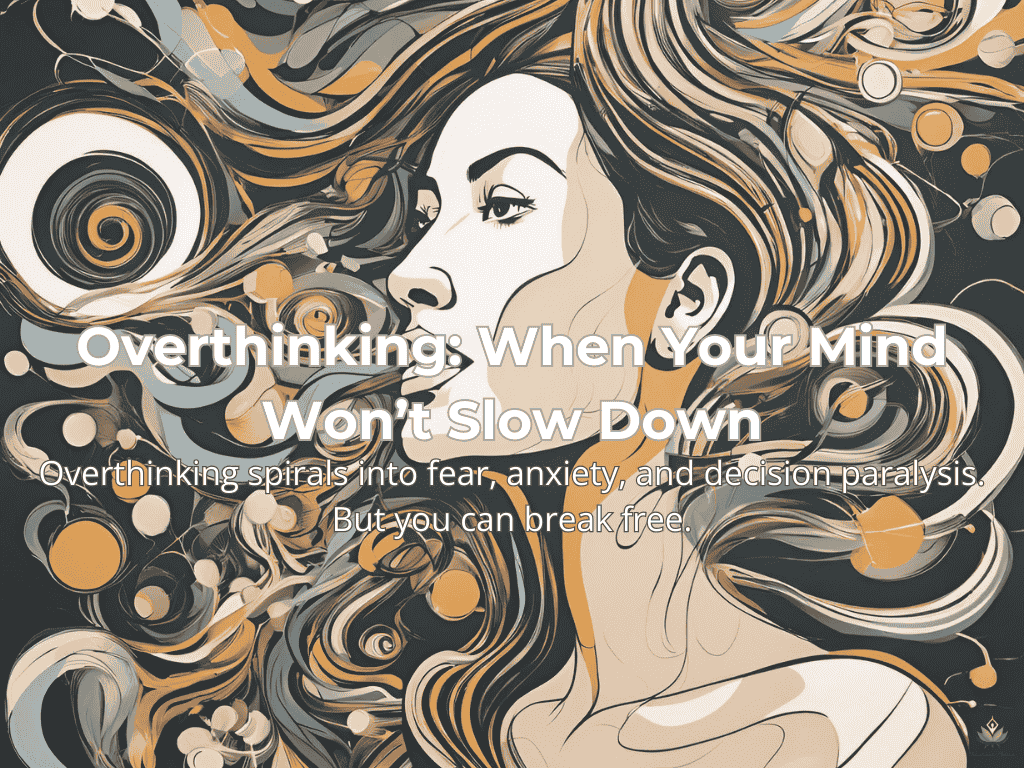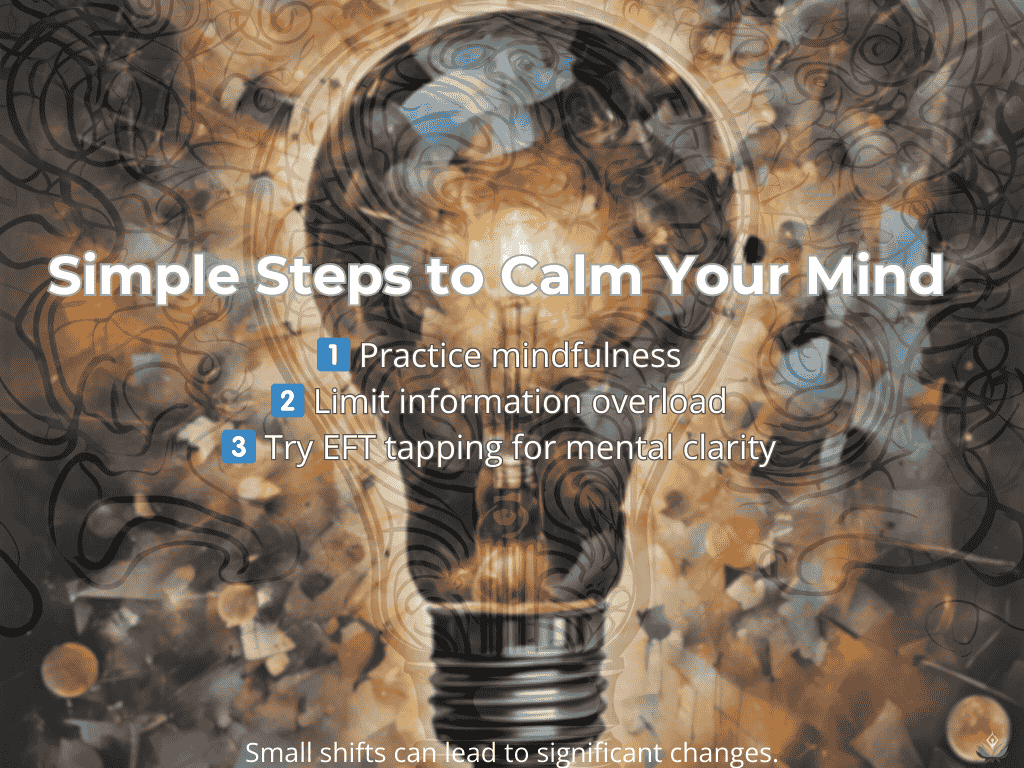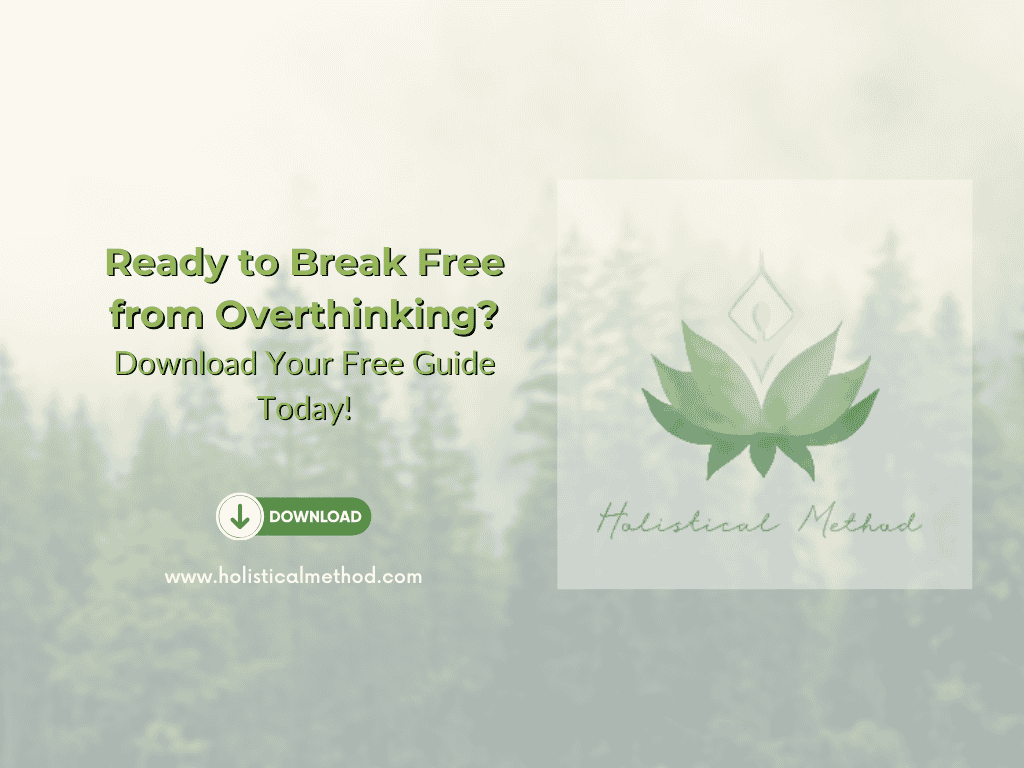Recurring thoughts known as overthinking create a mental desire that leads to anxiety and physical and psychological Exhaustion. Your ongoing mental activity of recalling past events while worrying about future matters will negatively influence your mental and physical condition. The advantage of escaping overthinking patterns is that it leads to mental clarity and prevents further mental burdens. With the right tools and mindset, it’s likely to shift from mental chaos to calm, focused thinking.
What is Overthinking, and Why Does It Happen?

The experience of overthinking causes thoughts to continue growing while dwelling on negative results and previous errors alongside imaginary scenarios. This condition stems from fundamental human anxieties regarding failure, public assessments, and unexpected events. Reflecting on situations occurs typically, but overthinking progresses past constructive reflection to create actions-blocking obstacles. It can make a cycle where the more you think, the more overwhelmed you become, leading to paralysis and inaction.
Ask yourself: Do I constantly replay conversations in my head? My inability to decide might stem from my anxiousness about picking an unsuitable option.
If this description fits your situation, overthinking could inhibit your ability to live fully.
Common Causes of Overthinking
Recognizing the fundamental reasons behind overthinking serves as a basis for its successful elimination.
Here are some common triggers:
Endless rumination often starts when a person fears that they will fail to reach expectations or commit errors.
Perfectionism demonstrates itself through unrealistic goals, which cause nonstop mental attacks and self-criticism and analysis.
Past experiences cause unresolved emotional pain, which triggers repeatedly negative thoughts when you encounter parallel situations.
The continuous stream of news and social media, along with modern digital information consumption, creates an overload that generates pointless mental stress.
Low self-assurance about your competence and decisions creates an excessive need to analyze every choice.
When you recognize these triggers, you establish your initial step to experience emotional liberation and mental clarity.
Signs You Might Be Overthinking
Overthinking occurs in several forms without people being aware of its presence. Here are some signs:
- Replaying Past Events: You review your words and actions to determine whether you handled the situations differently.
- Worrying About the Future: Obsessing potential outcomes and ‘what if’ scenarios leads to anxiety about things that may never happen.
- Decision Paralysis: Struggling to make even simple choices because of the anxiety about possibly choosing incorrectly, resulting in missed opportunities.
- Mental Exhaustion is feeling drained, anxious, and overwhelmed by one’s thoughts, which often leads to physical fatigue.
- Over-Planning: Trying to control every detail of a situation to avoid unexpected, mentally exhausting outcomes.
The moment has arrived to discover solutions that will break this repetitive pattern and bring back mental peace.
The Hidden Costs of Overthinking
When people engage in excessive mental analysis, it results in significant effects across mental health and physical conditions.
- Emotional Exhaustion: Ongoing mental engagement can deplete one’s energy, cause stress, and prevent one from concentrating on what is truly important.
- Sleep Disturbances: Insomnia, restless sleep, and unrefreshing nighttime rest often stem from overthinking.
- Strained Relationships: Overanalyzing interactions can create misunderstandings, tension, and distance between you and others.
- Increased Anxiety and Stress: The more you overthink, the more anxious and stressed you become, creating a vicious cycle that’s hard to break.
- Physical Health Issues: Chronic stress from overthinking can lead to headaches, digestive issues, and even high blood pressure over time.
How to Stop Overthinking

The act of breaking free from overthinking leads to improved mental relaxation along with better body health and leads to a happier life. The following actionable steps guide individuals toward refusing to overthink. You need mindful action to conquer the habit of excessive thought. Several proven methods exist to restore your thought control according to these steps:
- Practice Mindfulness.: Breathing profoundly and using meditation and grounding techniques can help you stay focused on the present moment. This practice can also reduce future-oriented thoughts and memories of past events.
- Journaling: Keeping a notebook handy enables thought recordation, frees your mind, and allows you to develop better clarity. Documenting your thoughts will help you identify behavior patterns and triggers for events.
- Limit Information Intake: To reduce mental clutter, set boundaries with technology, limit exposure to news and social media, and create time for digital detoxes.
- Use EFT Tapping: Emotional Freedom Technique (EFT) can help release the emotional triggers that fuel overt inking. Tapping on specific points while focusing on your thoughts can reduce anxiety and promote calm.
- Challenge Negative Thoughts: Examine the truthfulness of your concerns. Are they founded on facts or assumptions? Replace them with positive affirmations and practical viewpoints.
- Set Time Limits for Decision-Making: Give yourself a specific decision timeframe that stops constant debating and promotes taking action.
- Engage in Physical Activity: Exercise can help release built-up tension and shift your focus from your mind to your body, promoting relaxation.
How the Holistical Method Can Help
The Holistical Method offers a comprehensive approach to overcoming overthinking by addressing the mind, body, and spirit. Through a combination of mindfulness practices, energy healing techniques, and EFT tapping, you can:
- Calm Your Mind: Learn to stay present and reduce mental clutter through mindfulness and meditation.
- Release Emotional Triggers: Use EFT tapping to clear unresolved emotional baggage contributing to overthinking.
- Rewire Thought Patterns: Shift from negative, repetitive thinking to positive, empowering beliefs that support mental clarity and confidence.
- Balance Your Energy: Energy healing techniques help align your mind and body, promoting peace and well-being.
Universal life techniques will enable you to reach lasting concentration alongside emotional peace while enhancing your ability to manage thoughts.
Practical Exercises to Quiet Your Mind
Incorporate these exercises into your routine to help manage overthinking and promote mental clarity:
- Daily Affirmations: Begin your morning with uplifting affirmations such as, “I trust myself to make the right decisions” or “I release what I can’t control.”
- Mindful Breathing: Practice breathing exercises to ground yourself in the present moment. Inhale deeply for four counts, hold for four, and exhale for four.
- Visualization: Imagine a peaceful place where your mind is calm and clear. Visualize yourse f letting go of your worries and embracing tranquility.
- Gratitude Practice: Focus on what you’re grateful for to shift your attention from worries to positive experiences. Write down three things you’re thankful for each day.
- Progressive Muscle Relaxation: Follow an exercise to tense and relax each muscle group so physical tension becomes released while relaxation occurs.
- Create a “Worry Time”: Devote a particular moment to managing your concerns. Then, focus on other matters. After the designated time ends, shift your attention to different tasks.
Embrace Mental Clarity and Find Peace
Your life should not remain under the control of overthinking behavior. Identifying triggers with practical strategies and pattern recognition enables you to escape cycles, making you feel calm and focused mentally. Achieving mental clarity requires step-by-step actions that build permanent transformation. You should recognize that your objective is not to remove every thought because the goal remains to establish psychological peace with self-forgiveness and concentration. Take the first step today and discover how the Holistical Method can guide you toward mental freedom and emotional well-being.
Ready to Quiet Your Mind?

Download our free ‘5 Steps to Relieve Stress’ guide and start your journey to mental clarity today!
https://holisticalmethod.com/wp-content/uploads/2024/12/Stress-Relief-Guide.pdf
Angel Dimitrov. (2025). Holistical Method. https://holisticalmethod.com